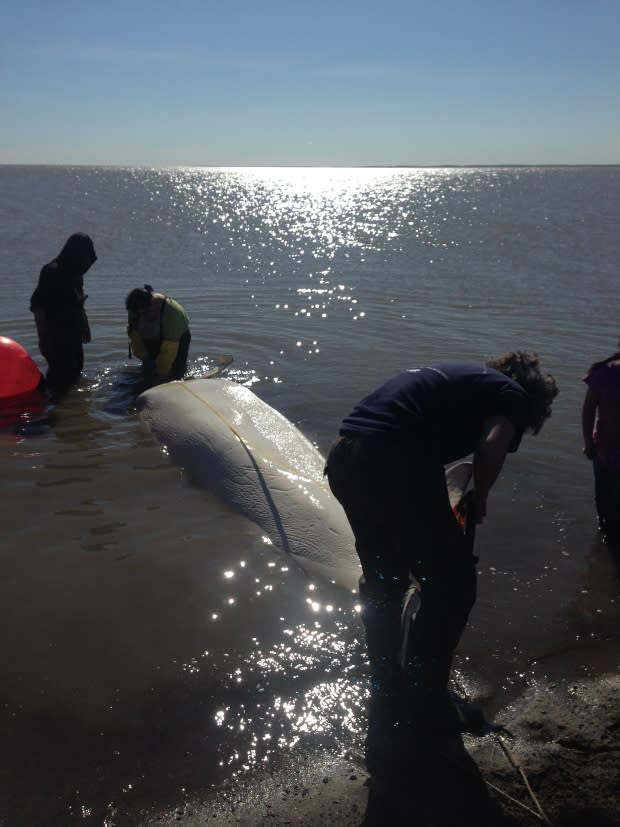'Full circle': DFO works with hunters, publisher to make beluga findings accessible to the public
The federal government is making beluga whale research more accessible to Canadians. That's why it teamed up with an academic publisher, scientists and Inuvialuit experts to make a special issue of the research journal Arctic Science, called the Beluga Summit.
Fisheries and Oceans Canada and the journal worked together to release scientific research on beluga whales that is accompanied by a series of plain-language summaries that laypeople can understand.
This comes two years after a major meeting about beluga health between Inuvialuit harvesters, scientists, and government officials.
The new research finds that beluga whales are doing well, according to Department of Fisheries and Oceans official Lisa Loseto.
"They're a healthy population," she said.
Plain-language summaries
Articles in the journal combine traditional knowledge and western science to try and find answers to questions hunters and trappers have been asking about the whales.
Hunters and trappers brought up their questions at the 2016 summit in Inuvik that brought together beluga aficionados from various walks of life. Hunters were particularly interested in whale migration patterns and in whether beluga meat was healthy to eat.
The articles are also accompanied by plain-language summaries online that are accessible to the public, so people who aren't scientists can also read about the findings.
Many of the papers in the special issue provide baseline knowledge about the whales, allowing future researchers to have information to which they can compare later findings. The journal includes articles on whale ears, seasonal habitat use, and the contaminants concentrations in the whales.
Loseto said Northerners are no strangers to bridging traditional knowledge and science. Researchers frequently ask elders and hunters for their knowledge about the land.
However, knowledge often ends up in an academic journal with little communication about the findings to the people who first helped the scientists.
"A lot of research happens in the North but they don't hear back about it," she said. "This has been trying to be full circle. We're being responsive and trying to communicate back."
She said she hoped this journal would give Inuvialuit harvesters more information about the animals they already know well.
Data will lead to informed decisions, says fisheries expert

John Noksana is a member of the region's Fisheries Joint Management Committee appointed by the Inuvialuit Game Council. He is also the committee's vice chair. He was part of the 2016 meeting. Noksana said it's important to keep track of the whales because whale meat is a main staple for his people.
He was particularly interested in learning more about whale migration patterns. "Shipping is becoming a big issue in the North," he said, and knowing where whales migrate could allow governments to develop routes that give them space.
When it comes from the land...it's good to know if it's healthy. - John Noksana, Fisheries Joint Management Committee member
"You want to make an informed decision, you've got to make sure you've got the best data available."
Whale research in the Inuvialuit settlement region has been happening for over 30 years, Noksana said.
Tuktoyaktuk's Verna Pokiak was a whale monitor from 2013 to 2015, taking samples of harvested whales for scientific research. She was also a co-author of an article for the journal about traditional knowledge of how the whales are faring in a changing climate.
She hasn't yet read the articles but she said that federal scientists "keep in touch" with the community about their findings.
"Research is important when it concerns our food," she said. "When it comes from the land...it's good to know if it's healthy."
Whales are healthy, studies find
One article finds that the trace numbers of polychlorinated biphenyls — a chemical once commonly found in plastic — have been decreasing in the whales since the chemical was banned. But, the decrease is "not as drastic" as scientists had hoped, Loseto said.
"Despite the fact that they're not being used, the decline isn't as rapid as we'd like in the whales," she said. "It might suggest that these contaminants are still circulating in the system through food webs, or maybe being re-expressed through sediments or water."
"So even though we haven't been using them as humans they're still around."
Loseto said that while there are trace amounts of the chemicals in the whales, they are still a healthy and nutritious food source and people should not avoid eating beluga as a result.

